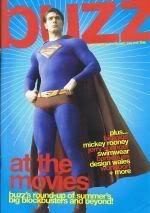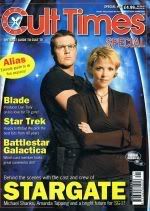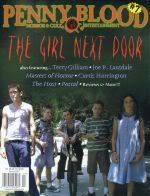Diary of the Dead (2007)
 George Romero is responsible for the three seminal zombie movies. His "holy trilogy", Night, Dawn, and Day, have yet to be matched, despite the hundreds and hundreds of zombie movies that have been made in the intervening decades. What made them so great was partly the biting social commentary contained within - and partly the fact that they were just damn good horror movies.
George Romero is responsible for the three seminal zombie movies. His "holy trilogy", Night, Dawn, and Day, have yet to be matched, despite the hundreds and hundreds of zombie movies that have been made in the intervening decades. What made them so great was partly the biting social commentary contained within - and partly the fact that they were just damn good horror movies.
In 2005, the fourth entry in the series was, well, something of a disappointment. It's not that Land of the Dead is a spectacularly bad film - I've seen far worse - but it certainly wasn't very good, especially not by Romero's standards.
Which brings us to Diary of the Dead.
Diary of the Dead is a crushingly bad movie. It fails on every single count you can think of. Obviously, it has a hell of a lot to live up to, and it's fair to say that it would be almost impossible for any film to meet the expectations of the generations of horror fans who've grown up with Romero's past works, but even taking that out of account, it's difficult to find any merit in this movie. Last year, I reviewed an independent British movie entitled The Zombie Diaries and criticised it on various fronts; yet nearly every criticism I levelled at that movie can also be directed at Diary of the Dead, and George A. Romero is hardly a first time director working on a shoestring budget. Diary of the Dead's handheld camera conceit also suffers from unfortunate comparisons to Cloverfield - but, again, even taking that out of account, Diary of the Dead is still rubbish. It's just that with Cloverfield providing a shining example of how to use the found footage conceit, Diary of the Dead's hamfisted attempts look even more amateurish.
The film starts with an explanation: a voice over explains that the film we're about to watch has been edited together from footage captured during the first days of a zombie virus outbreak, including footage downloaded from various Internet sources. One of the survivors, Debra, drones on about how she's adding voiceover and music in order to make it more scary. Then her edit, entitled The Death of Death, starts. The basic premise is that a group of filmmakers were out in the woods making a terrible horror movie about a zombie when the outbreak started. For whatever reason, the crew decides to stick together, setting off in a Winnebago on a mission to get "home". There's a lot of discussion about whether or not the news reports they're hearing about the dead getting up to attack the living is true or not, and a lot of discussion about why Jason is so insistent on continuing to film everything that's happening.
Obviously, in order for there to be a film for us to watch, he has to keep filming. And, I don't want to keep harping on this comparison, but in Cloverfield, the motivation to keep filming made sense; and yes, YouTube and MySpace are indeed full of random people's videos of random stuff happening, from videos documenting their everyday life and anxieties to survivors' eye views of huge and significant events. Actually, The Blair Witch Project made a pretty decent case for continuing to film even when you have every reason to believe your life is in great danger - it's a compulsion, a way to separate yourself from the atrocities happening to you, and a way to make sense of events. Or, as a last resort, a way to let someone else know what you were going through. It's not that much of a stretch for a movie to get away with, but Diary of the Dead really strains to make the point. And while Cloverfield often cut away, or switched the camera off during moments of extreme stress, Diary of the Dead's Jason never does. There's one absolutely ludicrous moment early on when the cast find themselves in an abandoned hospital, and the camera's battery is running low. Jason finds a plug, plugs it in to charge up, and then, while everyone else tries to find a doctor, or a survivor of any kind in the hospital, he stands and delivers a little monologue about how useless he is, how much he can't help, because he's plugged in.
Because putting the camera down is clearly not an option.
Debra finds another camera in the hospital, which is handy because it means the film can now use both viewpoints to give us those closeups and reaction shots we'd otherwise miss using only one camera (and which Cloverfield did quite well without); later, security camera footage will be stolen in order to provide wide shots of rooms before any cast members wander into them. Using all these different angles, as well as the voiceover and music, completely destroys the illusion of reality the film is so desperately trying to get us to buy into. It also makes it difficult to understand why Romero bothered to use the technique at all, since he clearly hasn't gone into it wholeheartedly. In the end, it just looks like any other horror film - everything is professionally lit, for example - but with a shaky camera. Nothing is gained from the supposed first person perspective, because it's not used properly. The person behind the camera disappears - usually, I suspect, because the footage is being shot by a cameraperson rather than by the actors. Often, it's difficult to remember who's holding the camera, or even that there's supposed to be a character there at all. There's a chase scene near the end of the movie in which Jason films Tracy running away from a zombie; instead of helping her, he just keeps filming. Often, he's closer to the zombie than she is, yet the zombie never turns to attack him. The immediacy and impact that having someone actually in the situation filming events can have is utterly lost to the void.
Nothing about any part of the film feels real, though. The characters are too two-dimensional; you never form any kind of emotional connection with them. The self-conscious dialogue ("dead things don't run!") only makes it worse; it feels like they're reading from a script. The professor character is bizarre; he just doesn't hold together as a character at all. The special effects - never a particular strong point of Romero's zombie movies - are appalling. Everything seems to be done with CGI, and one sequence in which a zombie is attacked with hydrochloric acid is just painfully fake-looking. There's always been humour in Romero's movies, but here it's jarring and nonsensical. Scenes that would be funny in another film either fall flat, or are funny, but not in the way they should be; they just serve to remind you that you're watching a scripted movie being filmed by professionals, rather than absorbing you into the illusion of a real experience.
It's difficult to know what this film was supposed to be. On the one hand, being awkwardly postmodern, it's possible that the dreadfully heavy-handed editing and awful voiceover are intentionally bad, because this is supposed to be a film made by students. But the image quality is too good for that; the lighting's too good. Plus there's a sequence in which there seem to be altogether too many cameras and not enough characters to hold them, so it's difficult to write off any other mistakes as intentional since a lot of the production feels careless. The satire and social commentary present in Romero's other films isn't absent here, it's just far too muddled to be effective. One minute he's presenting the mainstream media as deceitful and corrupt (probably true); the next he's pointing out that because the Internet gives everyone a voice, it's difficult to tune out the dross and find the truth, which is also true, but the two points don't sit comfortably together. There are other digs at the military and the government and pretty much everyone and everything else, but the lack of focus means that none of Romero's undoubtedly valid points actually sticks. He just seems to be lashing out, but without much idea quite what he's lashing out at. The scene in which Jason uploads his footage onto MySpace is almost embarrassing; footage on MySpace and YouTube just doesn't look the way Diary of the Dead thinks it does.
It's depressing, but this movie is a complete abomination. It's a terrible last entry into the Dead franchise, but I honestly couldn't face watching another one.
IMDB link










1 comment:
I really couldn't agree more. I don't know what I was expecting, but it was something a hell of a lot better than this. The Zombie Diaries was a much, much better film on a fraction of the budget. I didn't care much for [REC], but even that had some great moments. As far as first-person filmmaking goes, this really is the bottom of the barrel.
I've LOVED some of Romero's past work, but just can't comprehend how so much of the fanbase have blindly praised this garbage. Maybe it's time to just put the camera down, George.
Post a Comment